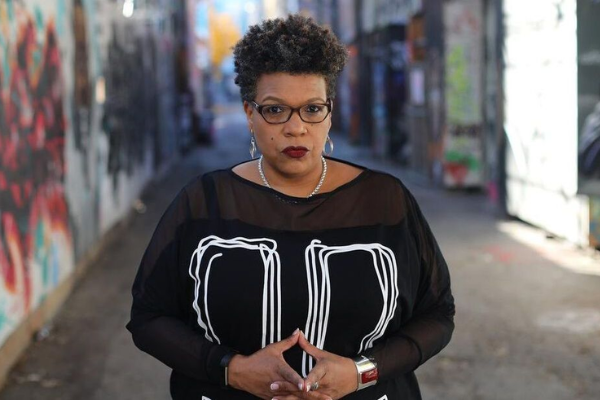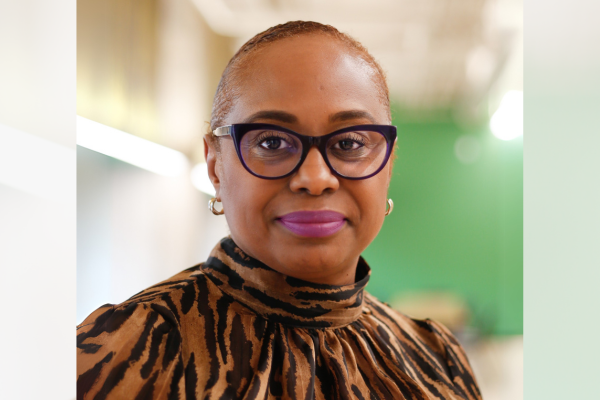First-of-its-kind initiative at U of T to amplify the voices of Black survivors of homicide victims in the GTA


A first-of-its-kind initiative from The Centre for Research & Innovation for Black Survivors of Homicide Victims (The CRIB) will amplify the voices of Black survivors of homicide victims in the Greater Toronto Area (GTA).
Led by Tanya Sharpe, an associate professor in the Factor-Inwentash Faculty of Social Work at the University of Toronto, the Invisible Wounds: Digitizing the Aftermath of Homicide project will showcase digital storytelling rooted in the experiences of African, Caribbean and Black (ACB) survivors of homicide victims in Toronto.
“The individuals we conducted focused group discussions with were able to create mini-documentaries of their perspectives on the impact of homicide,” says Sharpe, founder and director of The CRIB.
“The approach will help us to better understand the impact of homicide on their physical, mental and spiritual wellbeing, allowing us to develop culturally responsive approaches to supporting survivors as they grieve.”
Recently awarded the Black Research Network’s IGNITE grant, the project will help policy makers, researchers, medical and mental health care service providers understand the traumatic impact homicide has on the wellbeing of ACB survivors – and the coping strategies surviving family members and friends utilize to deal with the devastating tragedy. The project is also funded by the Social Sciences and Humanities Research Council Insight Grant.
The IGNITE grant will assist The CRIB in hosting community viewings of the digital stories and feature a panel of storytellers to connect with community members and key stakeholders about the project’s impact on their lives.
“The IGNITE grant will allow us to conduct culturally responsive research, which is our responsibility when we think about the importance of research as activism,” says Sharpe, one of nine recipients of the grant.
Launched in 2018, The CRIB, the first organization of its kind, is a multidisciplinary initiative established to advance culturally responsive research, policy, and practice for Black families of homicide victims.
“The goal and the idea behind developing The CRIB was to build a legacy of culturally responsive research, policy and practice for and in collaboration with Black survivors of homicide victims throughout our global communities,” Sharpe says.
Earlier this year, The CRIB launched another first, The CRIB’s Homicide Tracker. The interactive map visually depicts homicides across Toronto to highlight how ACB communities are disproportionately affected by homicide. The project, which took more than a year to develop, currently maps homicides that took place between 2004 to 2020, by neighbourhood.
Coupled with a report, Social Determinants of Homicide, the project launched almost two years after Statistics Canada released race-based homicide data for the first time, which also sparked calls for more trauma services.
The report shows that on average, 232 murders happen in Ontario each year. Of those events, 75 per cent of homicide victims are racialized and 44 per cent of those victims are from ACB communities. Compared to other cities in the province, Toronto has the highest number of homicide victims in Canada, with approximately 77 homicides each year.
The CRIB estimates that seven to 10 family members and close friends are left to cope with the loss of a loved one due to homicide. Using that statistic, The CRIB’s report highlights that approximately 3,850 Torontonians have been traumatically impacted by the murder of a loved one almost every day for the past five years.
The research and map also show that while ACB communities are disproportionately affected by homicides in Toronto, surviving family members and friends live in neighbourhoods that have limited access to grief and bereavement support and services.
“The Homicide Tracker and the Social Determinants of Homicide framework really allowed us to get individuals to understand the root causes behind the homicides occurring in predominantly in Black and brown communities,” Sharpe says.
When a user hovers over the map of Toronto, the tracker also displays social determinates such as unemployment rates, low-income prevalence, and education-level of each neighborhood. Meanwhile, the report digs deeper to share statistics on education, employment and income inequality, and mass incarnation rates in Toronto. These same social determinants placed Black communities at greater risk of infection during the COVID-19 pandemic.
The report concludes with action items addressing the social determinants of homicide and systemic inequities faced in ACB neighborhoods.
“The report is where we can begin to consider the structural inequities that our inherently, structurally violent and contribute to the lack of access to equitable educational, employment and housing opportunities,” Sharpe says.
When it comes to the future of social work and how the field can develop to better support survivors of homicide victims, Sharpe says that the pathway should be through a culturally responsive, multidisciplinary approach. From policy and law to education and medical care, Sharpe explains that this approach is critical to rebuild systems that can lead to concrete change.
“It’s important for our social work profession to understand that we should not be doing this work alone. Our approach and engagement should always be interdisciplinary,” Sharpe says.
“All of us have the responsibility to work collectively together to assist Black survivors of homicide victims in coping with the devastating impact of murder, helping them to not simply survive but to thrive in the aftermath of the unthinkable.”







